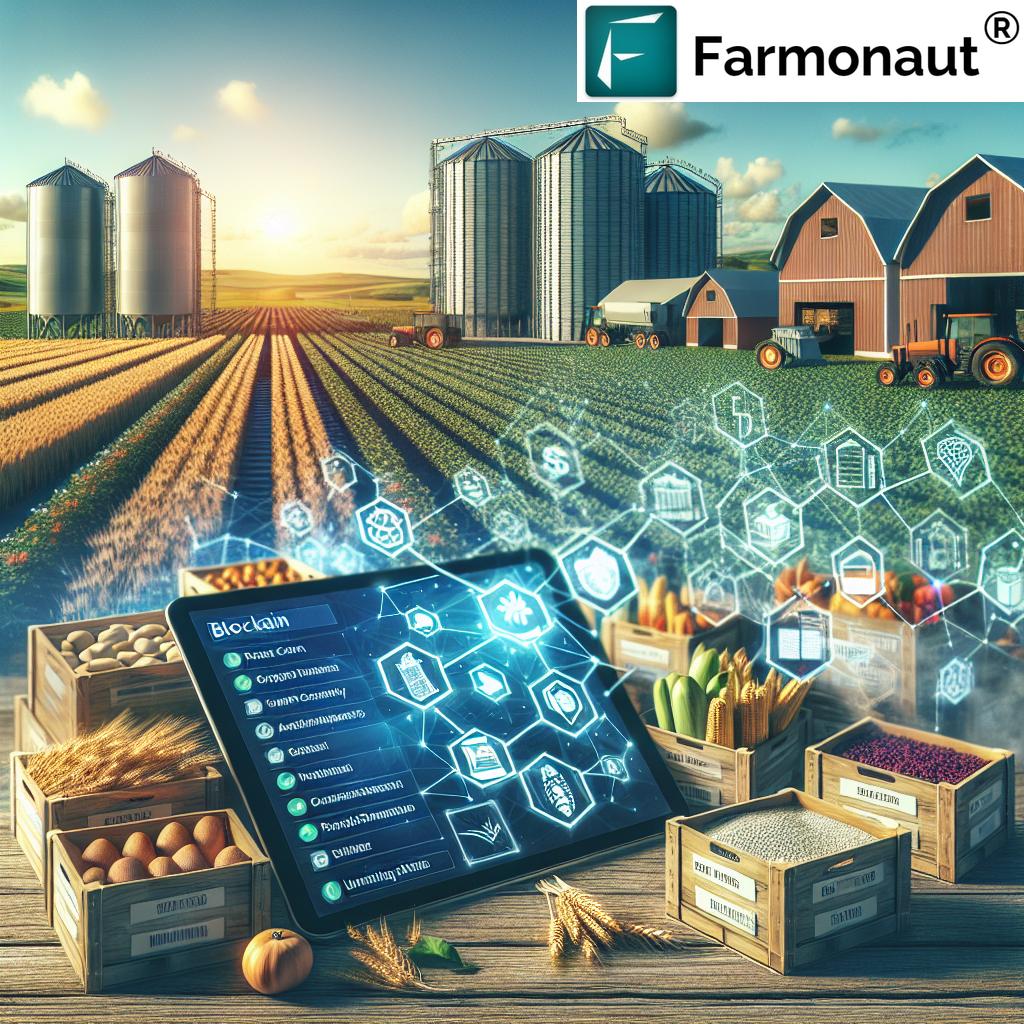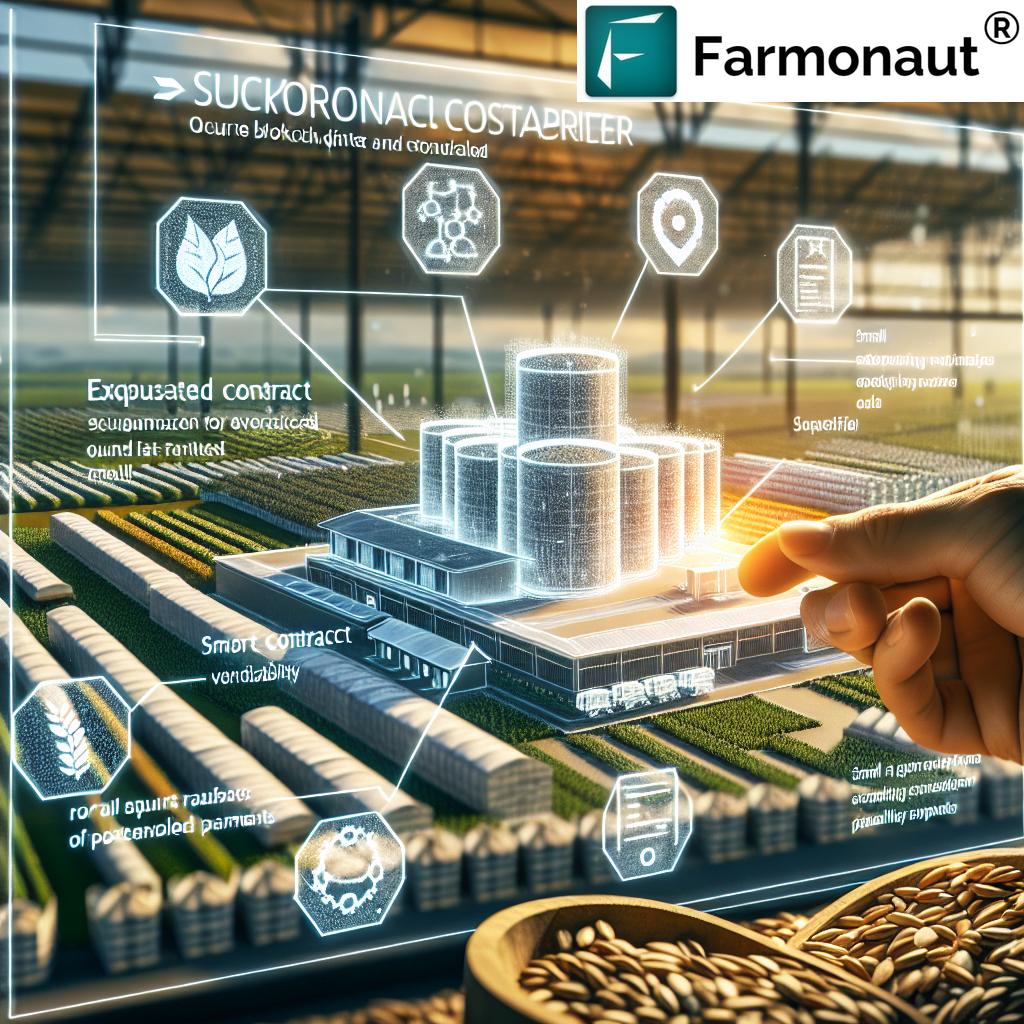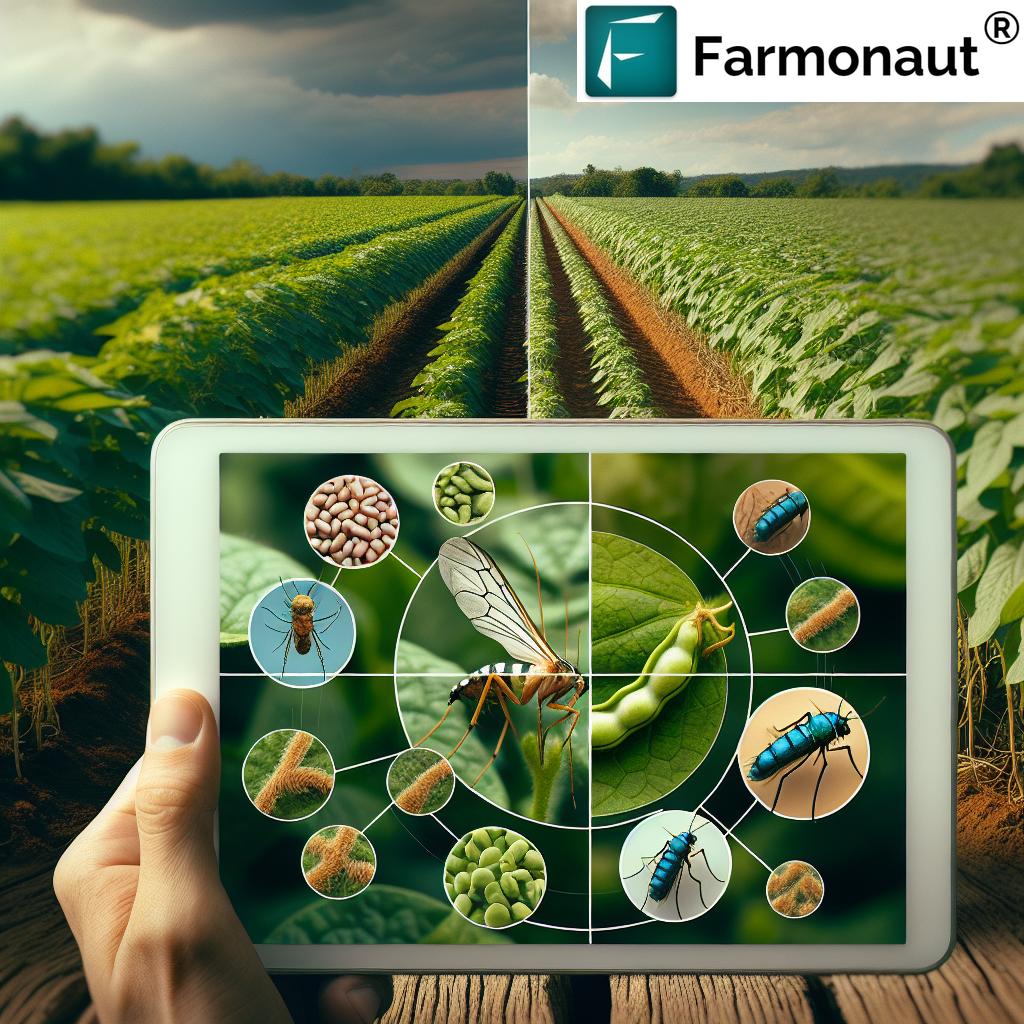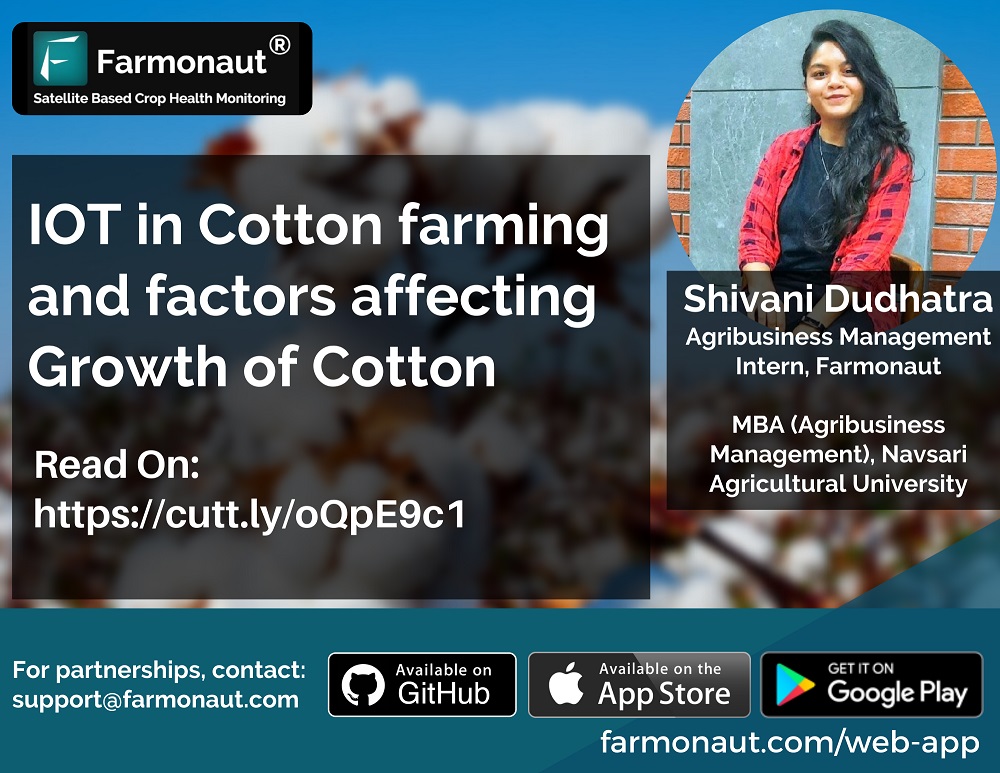Blockchain in Agriculture: Unlock Hidden Supply Chain Secrets
- Introduction
- What is Blockchain? A Quick Overview
- Unlocking Supply Chain Secrets: Blockchain for Transparent Agriculture
- Enhancing Traceability and Transparency in Agriculture with Blockchain
- Increasing Efficiency and Reducing Costs Through Blockchain in Agriculture
- Improving Food Safety and Quality Control with Blockchain Traceability
- Empowering Smallholder Farmers with Blockchain Technology
- Blockchain for Environmental Sustainability in Agriculture
- Farmonaut: Leveraging Blockchain for the Modern Agricultural Supply Chain
- Comparative Benefits Table: Blockchain vs. Traditional Agricultural Supply Chains
- Challenges, Adoption, and Considerations for Blockchain in Agriculture
- The Future of Blockchain in Agriculture Supply Chains
- Frequently Asked Questions (FAQ)
- Get Started With Blockchain-Aided Farming
“Over 20% of global food is lost yearly; blockchain traceability can reduce this waste by up to 30%.”
Introduction: Blockchain in Agriculture for a Transparent Food System
We’re witnessing a technological evolution across industries, and agriculture is no exception. Blockchain in agriculture is emerging as a transformative tool—promising to unlock hidden supply chain secrets, bolster transparency, improve food traceability, and empower farmers. This innovative technology, initially propelled by cryptocurrencies, is now redefining how we cultivate, monitor, and distribute food.
Despite the sector’s reliance on tradition, the push for agricultural supply chain transparency has never been more urgent. Consumers demand to know where their food comes from and if it is produced sustainably. Farmers crave fair pricing and reliable, timely payments. Food safety, environmental impact, quality, and trust are at the center of global discussion.
Let us explore the ways blockchain, with its decentralized and immutable ledger, is helping farmers and agricultural companies overcome long-standing challenges—creating a food system that is more sustainable, transparent, and efficient than ever before.
What is Blockchain? A Quick Overview for Agriculture
At its core, blockchain is a decentralized digital ledger that records transactions in a secure, transparent, and immutable way. Unlike traditional, centralized databases, blockchain operates as a chain of blocks with each block containing a batch of validated transactions. Once recorded, information on the blockchain cannot be altered retroactively, fostering trust and reducing fraud.
- Decentralized: Multiple independent parties (nodes) verify and store the same data.
- Immutable: Data, once written, cannot be changed or deleted, ensuring a reliable history.
- Transparent: All authorized participants can view transaction data, boosting accountability.
- Smart Contracts: Self-executing agreements automate payments and enable rapid, error-free business logic execution.
In the context of agriculture, blockchain’s unique technological attributes foster transparent processes, more efficient supply chains, and enhanced trust between stakeholders—from farm to table.
Unlocking Supply Chain Secrets: Blockchain for Transparent Agriculture
The agricultural supply chain is a sprawling, multi-layered network—spanning farmers, transporters, processors, distributors, retailers, regulators, and consumers. Each handoff brings potential for data loss, errors, fraud, or inefficiencies. Historically, tracking the journey of food products—and verifying claims about origin, sustainability, or safety—has been a challenge.
Enter blockchain food supply chain systems. By recording the movement, transaction, and status of every agricultural input, resource, and output, blockchain unveils “hidden secrets” within supply chains. It allows us to:
- Track every step: from the origin of produce to each distributor, retailer, and point-of-sale.
- Verify claims of organic, fair-trade, or sustainable farming with digital proofs.
- Enhance food safety with rapid recall capabilities and precise traceability in contamination events.
- Empower farmers—especially smallholders—with direct market access and better price discovery.
This technological foundation is propelling agriculture towards unparalleled transparency, accountability, and consumer trust. Let’s delve deeper into the pillars of its impact.
Enhancing Traceability and Transparency in Agriculture with Blockchain
Why Agricultural Traceability Matters
In modern agricultural systems, traceability—the ability to track and authenticate each product’s journey—has become indispensable. Events such as product recalls, food fraud, and labeling controversies damage consumer trust and cause economic loss for farmers and companies alike. The traditional record-keeping—fragmented and paper-based—is slow, opaque, and prone to manipulation.
Blockchain traceability in food brings a fresh perspective. It records every transaction in the supply chain—from seed purchase, fertilization, and harvesting to logistics and point-of-sale. Each entry on the blockchain is time-stamped, securely validated, and viewable by authorized stakeholders.
How Does Blockchain Enhance Transparency?
- Decentralized Record Keeping: All participants—from farmers to distributors—can verify entries, reducing the risk of hidden manipulations.
- Secure Data Storage: The immutable ledger ensures that previous records cannot be altered or deleted without consensus.
- Rapid Tracebacks: In the event of a food safety issue, blockchain allows companies to trace the origin of contaminated batches in seconds, compared to days with traditional methods (Learn more).
- Consumer Transparency: Shoppers can scan a QR code to see the entire supply chain history of a product—where it was grown, who produced it, and what processes it underwent.
This is particularly crucial for sensitive products—fruits, vegetables, honey, and any items where consumers or regulators demand traceback capability for food safety, labeling, and ethical sourcing.
With blockchain technology for farmers, the entire movement of food—from farm to table—is transparent, secure, and easily auditable.
Unlock robust Product Traceability with Farmonaut: By integrating blockchain, Farmonaut enables brands and producers to guarantee transparent and verifiable origins of their products, significantly improving food quality control, and enhancing customer trust.
Increasing Efficiency and Reducing Costs Through Blockchain in Agriculture
Supply chain efficiency is imperative in modern agriculture. Traditional operations often rely on intermediaries, complex paperwork, and lengthy manual processes—all leading to overhead, delays, and rising costs. Blockchain technology promises to change the game.
Through the use of agricultural smart contracts, blockchain streamlines and automates transactions. These self-executing contracts carry the rules of engagement directly on the blockchain—making payments, delivery, or compliance automatic as soon as specified conditions are met.
- Reducing Intermediaries: Farmers can interact directly with buyers, reducing transaction layers and associated fees.
- Automating Administrative Tasks: Smart contracts handle record-keeping, shipment releases, payment schedules, and regulatory checks—cutting manual process time and errors.
- Accelerating Transactions: With blockchain, payments are executed securely and instantly, helping farmers get paid on time.
- Reducing Fraud and Disputes: Every transaction is transparently recorded, verifiable by all parties, meaning less chance of disputes and fraud.
Enhance logistics with Farmonaut Fleet Management: Farmonaut’s solution enables agribusinesses to efficiently track and manage logistics, monitor fleet movement, and ensure the safety and timely delivery of produce—thus minimizing losses and optimizing the agricultural supply chain.
For example, in the context of grain or commodity trading, blockchain-based systems such as those highlighted by AgriDigital (source) are increasing trust, accelerating payments, and reducing costs—benefiting farmers, buyers, and banks alike.
Improving Food Safety and Quality Control with Blockchain Traceability
Ensuring food safety and product quality is foundational to consumer trust and brand reputation. Global food chains face risks such as contamination, mislabeling, or spoilage—events that can cause recalls, harm, and regulatory action. Traditional traceability methods take days to pinpoint sources and are not always reliable.
Blockchain’s immutable ledger creates new opportunities for improving food safety with blockchain:
- Recording Key Process Data: Each stage—harvest, packaging, warehousing, transportation, and retail—is recorded in real-time on the blockchain, making product history instantly verifiable.
- Accelerated Issue Identification and Resolution: In the event of contamination or mislabeling, blockchain enables nearly instant identification and resolution of the affected product, supporting fast, efficient recalls and minimizing health risks.
- Monitoring Storage and Transport Conditions: Integrating IoT sensors enables automatic recording of environmental conditions (temperature, humidity) during distribution—data which is written to the blockchain for verification, ensuring food remains safe and high-quality.
By making agricultural quality assurance transparent and data-driven, blockchain supports safer products, timely recalls, and minimizing of risks for all supply chain partners.
Farmonaut Carbon Footprinting aids in transparency by providing real-time data on emissions and environmental impact across supply chains, helping companies comply with safety and sustainability standards.
“Blockchain can cut agricultural supply chain fraud by 50%, ensuring safer, more transparent food for consumers.”
Empowering Smallholder Farmers with Blockchain Technology
Smallholder farmers form the backbone of many agricultural economies, yet they face unique challenges: limited access to markets, delayed or unfair payments, restricted microfinance, and lack of insurance. Blockchain and smallholder farmers is a combination ripe for impact.
- Direct Market Access: Blockchain platforms connect small-scale producers directly with buyers, bypassing intermediaries, and enabling fair pricing.
- Timely and Secure Payments: Smart contracts pay farmers instantly upon delivery or when agreed conditions are met—improving liquidity and resilience in volatile markets.
- Financial Inclusion: Verifiable ledger records strengthen credibility, making it easier for institutions to offer loans or insurance.
- Rewarding Sustainable Practices: Blockchain provides proof of sustainable or organic farming, unlocking premium prices and new consumer segments.
Solutions like Farmonaut’s offer these advantages through affordable, scalable, and easy-to-use technology—fostering blockchain technology for farmers, regardless of farm size or digital literacy.
Farmonaut Crop Loan & Insurance: Using satellite-based verification and blockchain records, this tool streamlines loan and insurance approvals, making financial services more accessible and reducing fraud risk for both farmers and banks.
Blockchain for Environmental Sustainability in Agriculture
As the world seeks solutions to environmental crises, blockchain for sustainable farming is becoming indispensable. Data-driven transparency helps stakeholders meet environmental standards, optimize resource use, and scale climate-friendly agriculture.
- Resource Tracking: Blockchain’s ledger can document every unit of water, fertilizer, or pesticide used—enabling optimization and reducing waste.
- Verifiable Sustainability Claims: Brands can offer consumers verifiable proof of sustainable practices, supporting eco-labeling and green certifications.
- Preserving Biodiversity: The technology can record plant variety and genetic data, aiding research and conservation efforts.
- Compliance and Monitoring: Regulatory agencies or certifiers can monitor farming practices in real-time, ensuring transparency and adherence to environmental best practices.
By promoting transparency and real-time monitoring, blockchain is helping to make agriculture more sustainable—aligning with global initiatives to reduce emissions and protect natural resources.
Farmonaut Large Scale Farm Management: Manage plantations, monitor farm operations, and implement scalable sustainability initiatives with Farmonaut’s comprehensive web and mobile tools, powered by data-driven insights and blockchain-enabled traceability.
Farmonaut: Leveraging Blockchain for the Modern Agricultural Supply Chain
In the rapidly evolving agritech landscape, Farmonaut stands out as a pioneering agricultural technology provider, making precision agriculture and blockchain-based traceability both affordable and accessible worldwide. Developed for farmers, agribusinesses, governments, and corporates, Farmonaut integrates satellite imagery, AI, and blockchain to solve core challenges in the sector.
- Satellite-Based Crop Health Monitoring: Real-time data on vegetation, soil moisture, and crop health help farmers optimize resource use and increase yields.
- AI Advisory Systems: Personalized, weather-driven advice empowers smart, data-backed decision-making and boosts productivity.
- Blockchain-Based Traceability: Every step of the product chain—from farm to consumer—is recorded, promoting trust, compliance, and efficiency.
- Resource & Fleet Management: Fleet tracking and operation optimization cut down costs and overhead.
- Carbon Footprinting: Track and reduce emissions with verifiable, secure data—critical for sustainability certifications and regulatory compliance.
Accessible via Android, iOS, web app, and robust APIs, Farmonaut’s scalable tools offer precise farm monitoring, supply chain transparency, and climate impact analysis tailored for everyone—from smallholders to multinational food brands.
-
Try it via our
Web App,
Android, or
iOS application. -
Power your own platform with our API
(See developer docs).
Farmonaut’s value lies in helping the entire sector transition to data-driven, sustainable, and efficient agriculture—bridging the gap between technology and traditional farming.
Comparative Benefits Table: Blockchain vs. Traditional Agricultural Supply Chains
| Feature | Traditional Supply Chain | Blockchain-Enabled Supply Chain |
|---|---|---|
| Transparency | Limited visibility, often opaque. Records are siloed and hard to verify. | Full, real-time transparency for all stakeholders across the journey. (% increase: up to 80%) |
| Traceability | Slow and manual. Tracebacks take days. | Instant traceability in seconds; automated event recording. (% increase: >90%) |
| Data Security | Paper or isolated digital records, vulnerable to tampering or loss. | Immutable, secure ledger; tamper-evident records for every transaction. |
| Farmer Empowerment | Dependent on intermediaries; payments delayed, minimal direct access. | Direct market access and instant payments; better price discovery; microfinance inclusion. |
| Transaction Speed | Slow (days to weeks); manual paperwork. | Automated, near-instant smart contract transactions; reduces delays by >85% |
| Fraud Prevention | Susceptible to fraud; difficult to audit changes. | Substantial fraud reduction (up to 50%); transparent and auditable transaction records. |
| Sustainability | Sustainability initiatives are hard to verify; limited data tracking. | Easy proof and tracking of sustainability for all supply chain participants. |
Challenges, Adoption, and Considerations for Blockchain in Agriculture
Despite its benefits, the adoption and implementation of blockchain in agriculture comes with real-world challenges:
- Technical Knowledge: Many farmers and agri-businesses lack the digital skills required for integrating blockchain solutions. Ongoing education and training are essential for effective use.
- Data Standards: The absence of standardized data formats or protocols impedes seamless integration, data exchange, and interoperability across the food sector. Collaboration to develop common standards is crucial.
- Scalability: Some blockchain platforms may struggle to handle the high volume of agricultural transactions at peak times or on large, national supply chains.
- Regulatory Uncertainty: Ambiguity around legal enforceability of smart contracts, data privacy, and blockchain governance remains. Legislation must keep pace to unlock full benefits (Read more).
- Cost and Infrastructure: Initial implementation costs, especially for smallholder-dominated regions, may be prohibitive. Affordable, mobile-friendly solutions—like those developed by Farmonaut—are mitigating this challenge.
- Change Management: Shifting entrenched systems and convincing all stakeholders to transition to a decentralized model can take time and dedicated support.
Nonetheless, through focused training, evolving standards, and regulatory clarity, the sector is steadily moving towards broad integration of blockchain for effective, resilient food systems.
Farmonaut Crop Plantation & Forest Advisory: Leverage satellite and blockchain-powered insights for improved farm planning, decision support, and compliance in plantation, forestry, and conservation initiatives.
The Future of Blockchain in Agriculture Supply Chains
As blockchain in agriculture matures, it is poised to serve as a backbone for food security, sustainability, and farmer prosperity in the coming decade. We anticipate:
- Universal Traceability: Blockchain-based tracking becoming the gold standard for fresh produce and value-added food products globally.
- Integrated Ecosystems: Seamless data-sharing between IoT sensors, AI-driven insights, and supply chain platforms.
- Consumer-Led Transparency: Trust and transparency will be demanded by consumers, with purchase decisions relying on verifiable product histories.
- Financial Inclusion: Agriculture’s digital records will support new lending, insurance, and risk management models for all farmers.
- Verified Sustainability: Tracking resource use and emissions on the blockchain will be required for compliance with both government and retailer mandates.
As adoption grows and the technology evolves, blockchain will serve not only as a solution to existing pain points—but also as a platform for agricultural innovation, collaboration, and growth.
For those seeking to future-proof their farm or food business, integrating blockchain-powered solutions with platforms like Farmonaut remains a forward-looking strategy—facilitating better outcomes for producers, consumers, and the planet.
Frequently Asked Questions (FAQ)
1. What is blockchain and why is it important in agriculture?
Blockchain is a decentralized and secure digital ledger that records transactions in an immutable, transparent way. In agriculture, blockchain provides traceability, improves food safety, builds consumer trust, and empowers farmers by enhancing transparency and reducing inefficiencies in the supply chain.
2. How does blockchain improve traceability and food safety?
By recording every step of a product’s journey on a public or permissioned ledger, blockchain offers instant traceability from farm to table. This supports rapid recalls, easier provenance verification, and better risk management in cases of contamination or mislabeling.
3. What are smart contracts and how do they help farmers?
Smart contracts are programmable, self-executing agreements recorded on the blockchain. In agriculture, these automate payments, compliance, shipment tracking, and other operations—ensuring secure, timely,fair, and transparent transactions for farmers, buyers, and all supply chain stakeholders.
4. Is blockchain technology accessible for small farmers?
Yes. While adoption can be a challenge, platforms like Farmonaut are making blockchain-based tools accessible, affordable, and easy to use, often via mobile apps and APIs designed for all scales of farmers.
5. How does blockchain promote sustainability in agriculture?
Blockchain can record and monitor resource use (water, fertilizer, carbon emissions) and provide verifiable data for sustainability certifications, carbon credits, and environmental compliance—helping farms and companies transition to green practices.
6. Are there any regulatory or implementation challenges?
Yes, including data interoperability, lack of standardization, cost of deployment, and the need for clearer regulatory frameworks for transactions and smart contracts. However, ongoing technological improvements and industry cooperation are steadily addressing these.
7. Can blockchain help with crop insurance and farm loans?
Absolutely. Blockchain and satellite-based farm verification (as offered by Farmonaut) make loan and insurance records more reliable, minimize fraud, and help more farmers access financial products efficiently.
8. Where can I get started with blockchain-based farm management?
You can explore Farmonaut’s platform—available as a web, Android, or iOS app, as well as APIs. These solutions offer satellite crop monitoring, advisory, traceability, fleet, and resource management—all with blockchain security and transparency.
Get Started With Blockchain-Aided Farming
Try Farmonaut Blockchain, Satellite, and AI Solutions:
- Carbon Footprinting: Real-time tracking, monitoring, and reporting on emissions and ecological impact.
- Traceability: Transparent records of produce from field to market, ensuring supply chain authenticity and consumer confidence.
- Crop Loan & Insurance: Secure, satellite-verified solutions for financial access and fair claims.
- Fleet Management: Real-time fleet and resource management to minimize operational losses and delays.
- Large-Scale Farm Management: Monitor large plantations, optimize agribusiness operations, and implement sustainable practices at scale.
Blockchain in agriculture is transforming how we grow, distribute, and consume food—ensuring a future that is transparent, efficient, sustainable, and fair for all. With leaders like Farmonaut making advanced tools accessible to everyone in the sector, now is the perfect time to explore blockchain technology for agricultural efficiency and trust.












